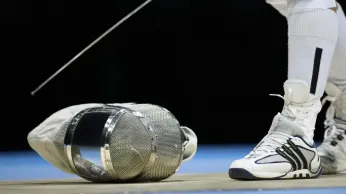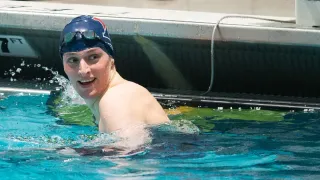
3 hours ago
Transgender Athlete Dinah Yukich Sues USA Fencing Over Transgender Sports Ban
READ TIME: 3 MIN.
Dinah Yukich, a transgender woman and competitive fencer, initiated legal action against USA Fencing (USAF) and the United States Olympic and Paralympic Committee (USOPC) after being denied entry to the USA Fencing Premier Challenge, held in New York state in September. Yukich, who began her medical transition in 2021, had previously competed under her affirmed gender when USA Fencing permitted gender marker changes for transgender athletes. Her eligibility to participate came into question when, in July, USA Fencing amended its participation rules to require that “athletes competing in USA Fencing-sanctioned tournaments must compete according to their biological sex” .
This policy shift was reportedly prompted by changes made by the USOPC, which revised its eligibility rules to align with executive guidance from the federal government. However, there is no current federal legislation that mandates the exclusion of transgender athletes from sports; rather, the changes appear to be in response to political pressure and executive orders that lack the force of law .
Phil Andrews, CEO of USA Fencing, stated that the organization updated the competition-gender field for all transgender members to match their sex assigned at birth and personally contacted each affected member to explain the change and offer support resources. Yukich, upon being notified, described the policy as demeaning and offensive, and filed a complaint with USA Fencing. That complaint was closed without a finding, with USA Fencing citing its revised competition policy as justification .
Yukich’s lawsuit, filed in New Jersey Superior Court, seeks both compensatory and punitive damages on the grounds that USA Fencing’s policy violates anti-discrimination statutes in multiple states, including New York, where the denial of entry occurred. Yukich and her legal team argue that the policy constitutes a direct violation of state-level protections for transgender individuals, which in states like New York explicitly prohibit discrimination on the basis of gender identity in public accommodations, including sporting events .
The legal complaint also challenges the USOPC’s decision to revise eligibility rules, alleging that the change was made under false pretenses of federal legal obligation. As noted by advocacy groups and legal experts, no current federal law compels sports organizations to bar transgender athletes; rather, the Trump-era executive orders referenced by the USOPC are not legally binding, and Congress has yet to pass legislation on the issue .
Yukich’s case marks the first known instance of a transgender athlete suing the USOPC over the enforcement of a transgender sports ban, and has galvanized support from LGBTQ+ advocacy organizations nationwide. Many see the lawsuit as a crucial test of the legal protections afforded to transgender people under state and federal law. Advocacy groups argue that policies requiring athletes to compete according to their sex assigned at birth are not only discriminatory, but also harmful to the mental health and well-being of transgender athletes .
LGBTQ+ sports advocates have pointed to the broader implications for access and inclusion in sports. They note that competitive fencing, like many other sports, has seen increasing participation from transgender and non-binary athletes in recent years, and the outcome of Yukich’s lawsuit could set an important precedent. If the courts rule in favor of Yukich, it could compel national sports organizations to reevaluate and potentially reverse exclusionary policies, ensuring greater access for transgender athletes across the United States .
The lawsuit comes amid a broader national debate over the participation of transgender athletes in sports. Several states have enacted laws or executive orders restricting transgender students' and athletes’ ability to compete in accordance with their gender identity. The Biden administration has taken steps to clarify Title IX protections for transgender students, but the issue remains unresolved at the federal level, with conflicting interpretations and ongoing legal challenges .
Organizations such as the Human Rights Campaign and Lambda Legal have condemned the USA Fencing and USOPC policy changes, emphasizing that such policies run contrary to both the spirit of sport and the growing body of anti-discrimination law in the United States. They argue that sports organizations should adopt inclusive policies that respect the gender identity of all athletes, while also ensuring fair competition .
As legal proceedings begin, the case of Dinah Yukich vs. USA Fencing and USOPC is expected to draw national media attention and could have significant ramifications for transgender athletes and sports policy nationwide. The outcome will be closely watched by sports governing bodies, lawmakers, and LGBTQ+ advocates—all of whom recognize the potential for the case to influence future policy decisions and legal interpretations regarding the inclusion of transgender athletes in competitive sports.
For Yukich and other transgender athletes, the lawsuit is not only about personal participation, but about affirming the right to compete openly and authentically, free from discrimination. The legal challenge underscores the broader struggle for LGBTQ+ equality in all areas of public life, including the arena of sport.






